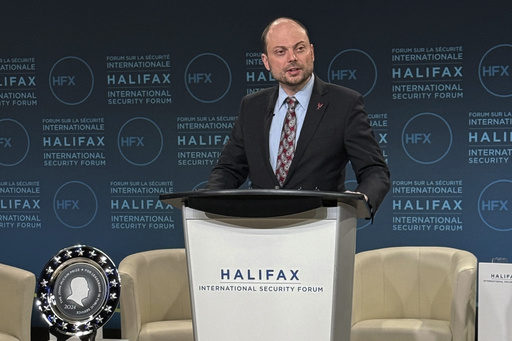BERLIN — Vladimir Kara-Murza, a notable Russian opposition leader recently released in a significant East-West prisoner exchange, stated on Tuesday that concerns regarding potential poisoning of his mother in Berlin have proven unfounded.
A dual citizen of Russia and the U.K., Kara-Murza reported that the suspicions surrounding his mother—rumored to have been poisoned or to have suffered a heart attack—were not backed by evidence. He confirmed that she is still receiving medical care in a Berlin hospital where she is undergoing further examinations. “My mom is indeed in a hospital in Berlin, but suspicions of poisoning or a heart attack haven’t been confirmed, thank God,” he mentioned via the messaging platform Telegram.
Kara-Murza had been detained in 2022 following his outspoken critique of the war in Ukraine that commenced shortly before. In 2023, he was sentenced to 25 years in prison for treason among other charges, a ruling he asserts is politically motivated. He previously experienced severe health issues in 2015 and 2017, attributing two near-fatal poisonings to actions taken by the Kremlin.
As part of a historic deal in August, Kara-Murza was one of 16 prisoners released by Russia and its ally Belarus. This exchange involved individuals such as Americans, Germans, and other Russian dissidents, who were generally deemed to have been jailed for political reasons. Names among those freed included journalists Evan Gershkovich and Alsu Kurmasheva, as well as former U.S. Marine Paul Whelan.
In exchange, Russia received eight of its nationals who had been incarcerated in the West for various offenses, including espionage and computer hacking, alongside other serious criminal charges. The negotiations for this swap were lengthy, with prior discussions rumored to involve Russian opposition leader Alexei Navalny, just before his sudden and puzzling death in a remote prison in February. Navalny’s family and supporters accused the Kremlin of being responsible for his death, which the Russian government has adamantly denied.
Navalny had been imprisoned since January 2021, upon his return to Moscow after recovering in Germany from what he asserted was a nerve agent poisoning linked to the Kremlin. Last month, Kara-Murza, who recently received the Pulitzer Prize, participated in a march in central Berlin, rallying alongside at least 1,000 individuals against President Vladimir Putin and the ongoing war in Ukraine.
On the same day, German authorities reported that a German-Russian woman had been admitted to an isolation unit at Charite hospital in Berlin after expressing concerns about a possible poisoning. Although the identity of the woman was not disclosed, she raised her suspicions to medical personnel at a clinic, leading to an immediate relocation for further tests. Blood samples are currently being analyzed for various toxic substances, and investigators are looking into the potential for attempted homicide, with all appropriate precautions being taken to identify any suspects involved.
Copyright @2024 | USLive | Terms of Service | Privacy Policy | CA Notice of Collection | [privacy-do-not-sell-link]


